To Be a Pilgrim: Discovering Faith and Resilience on the Camino de Santiago
how a 550-mile trek along an ancient pilgrimage led me to encounter God for the first time
What follows is based on what became my first paid publication, appearing in the book Spain from a Backpack in 2005. More recently, it appeared in Our Story Magazine (Summer 2023). It recounts my experience from October 2004.
This is the worst day yet.
The wind whips around me, shoving me off course and flapping my jacket wildly against my arms. My backpack, tightened around my hips and shoulders, pulls me toward the ground. My aching legs strain to propel my body forward on blistered feet, and my eyes squeeze nearly shut, tearing up against the stinging sand blown by the roaring wind. On both sides of the road, groves of poplar trees bend and shake with every gust, hurling leaves and twigs in all directions. Above, dark clouds boil and swell, full to bursting with the threat of rain.
One hundred seventy miles into this 500-mile trek across northern Spain, I wish I had never heard of the Camino de Santiago.
.
.
.
A month earlier, safe in the comfort of my childhood home, this pilgrimage from the mountains of the Basque country to the holy city of Santiago de Compostela had seemed romantic and adventuresome. This small city in Spain’s northwest corner, the supposed resting place of St. James, was one of the most important cities to ancient Catholics, after Jerusalem and Rome, and for centuries, this trek had been the most famous journey in Christianity, equivalent to the Muslim pilgrimage to Mecca. I had started out full of hope and excitement—certain of the physical mastery and spiritual wisdom I would gain in the weeks ahead.
The trek’s spiritual nature was part of what drew me to it. That summer, newly graduated from Vassar College with a near-useless degree in the humanities, I had begun to read about religion, Christianity in particular, and I had slowly learned that, although it was characterized in American culture (and my own mind) by intolerance, fanaticism, anti-intellectualism, and social conservatism, none of these things was actually central to the faith.
I learned that God is not necessarily male: that actually God is ungendered, referred to by some ancient Jews as MotherFatherGod. I learned that the biblical basis for many socially conservative positions is tenuous at best, certainly not found in the teachings of Jesus himself. I learned that people existed who were somehow both intellectually curious and faithful—some even sporting a sense of humor as well.
I read books by people who, like me, had grown up irreligious or even anti-religious and had come to faith later in life, unexpectedly knocked off their feet by something, or someone, they had never imagined. I sensed a difference in these authors’ writing, an inner peace that I had not encountered before, and I was intrigued. I began to experiment with prayer and to read the New Testament, starting with the gospels.
Meanwhile, I had been planning a several-month trip to Spain with my college friend, Heather, with whom I hoped to escape the clutches of cubicles and corporate ladders. We had purchased one-way tickets from New York to Madrid and started saving money. Our plans were nebulous. When Heather called and said she had heard about this “crazy awesome” trek across northern Spain called the Camino, it wasn’t until I discovered the path’s Christian origins that I became interested. I had never backpacked before. I had never done more than a day hike of seven miles or so, and walking 500 miles sounded like masochistic, adrenaline-seeking insanity to me. But I was fascinated by the path’s mystical history. I saw that this Camino had purpose. It had roots. And it promised to make me a pilgrim, whatever that meant.
.
.
.
After twelve days on the trail, I thought I would be through the hard part and that my body would have adjusted to covering 12 to 25 miles a day with a heavy pack. I had learned how to care for my blisters by threading them with iodine-soaked string, and my legs had grown stronger, but I had begun to realize that this pain, pounding up through the bones of my feet into my knotted shoulders, searing through the skin of my heels and the muscles of my neck, would be as much a part of the trek as the dry ham sandwiches we choked down daily from the small-town bars that dotted the trail and the yellow shells painted on walls, rocks, and signposts to mark the path.
The physical difficulty of this pilgrimage should not, I learned too late, be underestimated. Those who know invest in high tech, ultra-lightweight equipment to keep the load on their backs under 15 percent of their bodyweight—the recommended maximum for a trek of this length. Amateurs that we were, our packs weighed double that.
Originally, Heather and I had thought to take closer to two months to complete the 500 miles, but we became fast friends with a goofy Englishman, Will, and a gay, German philosopher of Spanish origin, Angel (pronounced An-hel), whose flight home from Santiago was set for 37 days from the night we started. In order to finish the trail as a group, we could not afford to take a single day of rest and had to average close to 20 miles a day.
After two weeks at that pace, we were all suffering the consequences: Heather developed a chronic, searing pain in her right knee; Angel was trying to stave off tendonitis in his left ankle; and Will had to stop at a hospital when his blisters became alarmingly infected.
This was serious business. Some travelers became too injured to continue walking and hired taxis to drive them to the next town so they wouldn’t fall behind their companions. But we considered any use of non-ambulatory transportation to be cheating. We would rather risk permanent injury than not make it to the day’s destination on our own two feet.
One morning I woke up with a severe stomach flu, yet I staggered on, vomiting every 20 minutes, Will carrying my pack for me up the hills and waiting while I squatted miserably behind a bush every hour or so. We were only able to complete seven or eight miles that day, so we fell hopelessly behind the rest of the group, which had gone on without us. However, we determined to catch up once I was feeling stronger by walking around 25 miles a day for the next three days.
I never would have thought myself capable of walking that far in one day, much less with a heavy pack, up hills, and for several days in a row. But it didn’t seem so remarkable at the time.
Now that we were peregrinos, our lives had only one purpose: to place one booted, aching, blistered foot in front of the other. This is the creed of the pilgrims on the Camino de Santiago.
.
.
.
Despite these physical accomplishments, my dreams of spiritual significance remained entirely unfulfilled.
I discovered on the first night—settling into our room in St. Jean Pied-de-Port, just over the Spanish border into France after a light dinner—that I was the only one there with anything other than adventure or tourism on my mind. My companions—with whom I spent eight hours a day trudging along the trail, with whom I ate all my meals, with whom I shared a room each night—while wonderful friends and very entertaining company, were the fiercest atheists I had ever met. The path was full of tourists and thrill-hunters but utterly devoid of spiritual seekers or mystics. Most people I encountered found Christianity antiquated and laughable, if not outright offensive.
The day of the storm, we had taken the morning off to visit the world-famous cathedral of Burgos. A huge, grey mass of spires, stone, and stained glass, Burgos housed more gilded opulence than I could fathom. Staring up, open-mouthed at the white, vaulted ceilings and pillars carved with a thousand cherubs, I wondered at the immense quantity of wealth, resources, and labor that had gone into this building. What purpose did it serve? Why did the leaders of the medieval church feel the need to create something so grandiose? It struck me as incredibly contrary to the message of simplicity and servitude that the man they worshipped had given his life to demonstrate. I knew the building must have been designed to inspire awe at the glory of God, but what I felt was revulsion at the greed of mankind and the waste of all this extravagance while millions were starving and dying.
I felt confused and saddened as we left Burgos around 2 p.m. We left later than we had planned with 12 miles still to pound out before dark. After an hour, a violent storm rushed over the meseta, blowing so hard that any forward progress at all required unusually focused and painful effort.
Now, my three companions have fallen behind, and for the last half hour, I have been trudging onward, seemingly alone, across the desolate plain. I can’t hear even the crunch of their footsteps on the gravel over the wind. The task at hand—simply to keep moving forward—takes all my concentration.
I think of the miles left to travel that day, that even when I do reach shelter that night I will have only a cold shower, a greasy sandwich, and a few hours of sleep until I have to drag myself out of bed and do it all again, pain and exhaustion only increasing with each day.
I think about my life: how I have been doing all the right things yet am prepared for nothing; how I spin like the dial on a compass at each new magnetic north pole, vacillating from one interest or career to another, utterly lost and without purpose; how I yearn to be known and to know another deeply yet feel more and more isolated.
I look up from the rocky ground in front of me, from my mud-caked boots and six-days-dirty pants, from the endless ribbon the humble path makes off toward the distant horizon, up toward the thrashing treetops, the steely sky, the furious clouds. I feel like a moth in a tempest struggling not to be crushed into dust.
How did I ever think I could conquer this distance? What arrogance made me think I could control my life? To the wind, to the world, I am nothing but a bit of carbon to be toyed with, like a mouse for a cat—beckoned beguilingly onward only to be picked up and smashed open like an oyster on rock.
The power of nature overwhelms me—my vulnerability sudden and terrifying. On the verge of panic, I close my eyes and continue forward, giving myself up to the wind, sending my thoughts into the twisting sky, seeking a path through those malicious clouds. Light and dark play over the vapor above me, flashing and moving, indifferent to my struggle.
And then it happens.
In an impossible instant, the beauty of that struggle, the truth of it, blots out all other sensations. Suddenly I am above the clouds, broken free of their turmoil, and a glorious calm floods me. In awe, I find I have only one possible response: to pray.
I call to God aloud for the first time, asking Him to help me, and as my cries are swallowed by the wind, I become lighter. When words run out, hallelujahs replace them, floating upward, resonating with the storm. I lift my arms, riding the turbulent air, and find it helps me balance. Face turned upwards, I push on, the dark, shifting clouds still there but no longer insurmountable.
I am carried on by the wind, not in spite of it, my hair, yellow like straw, whipping about my face as the trees thrash over the fields. I am filled with a light that tingles in my core and makes me strong with hope. In this moment, God proves Himself to me as undeniably real.
I no longer feel small and insignificant. Or, more precisely, I feel perfect in my insignificance. I am part of this place in all its chaos and fury and beauty and power. My legs stride certain and strong beneath me, and I delight in the ability of my body—my tiny, flawed, imperfect body—to propel me forward in such a tempest.
Utterly alone, I feel utterly complete.
I no longer feel small and insignificant. Or, more precisely, I feel perfect in my insignificance. I am part of this place in all its chaos and fury and beauty and power. . . . Utterly alone, I feel utterly complete.
.
.
.
I don’t know how long I continue like that, walking in a euphoric daze, flying over the trail at an incredible pace. Finally, reluctantly, I stop because I realize my friends may soon become worried if they don’t see me.
When they catch up, I am astounded to find that theirs has been quite a different experience.
Heather is the first to plod up, gripping her walking stick tightly in one hand, cheeks red with windburn. “I hate this f---ing wind,” she says, pounding her walking stick into the ground. “I was screaming at it back there: ‘Bring it on, you bastard!’”
“Uh, think it heard you?” I ask.
“I don’t f---ing know. I just hate it.” She pulls out her water bottle and drinks.
Angel and Will walk up then, faces grim, hats pulled down over their ears.
“You two alright?” I ask, struggling to keep my elation from showing on my face.
“Let’s just keep going and get out of this miserable f--- of a wind,” Angel spits out in his German accent. Will only nods, uncharacteristically silent.
We start back down the trail, but I am stunned at their bitterness and frustration. It is tragic to me that they have been so angry while I have been so exhilarated.
And that’s when I know something in me has been changed inexorably by that time in the storm. A gulf has opened between me and my friends—these fellow pilgrims with whom I have spent every minute of every day for the past two weeks, singing until we are hoarse, crying from pain and exhaustion, laughing to tears. And even more surprising, I wouldn’t cross back over for anything in the world.
.
.
.
Weeks later, we make it to Santiago together and even decide to walk 50 more miles to Finnesterre—the “end of the world,” the westernmost tip of continental Europe—and we never succumb to a day off or a ride in an automobile. We become closer in those 37 days than many friends become in a lifetime. But I never tell them about that moment in the storm.
In the days and years since, I have only to think back to the light that surged through me on that meseta to recall that feeling of strength and hope. Whenever I fear I have lost my way, I remember that day and the force that guided me, that guides me still.
For that is the greatest lesson of the Camino: a true pilgrim is never really alone.
And that? That changes everything.


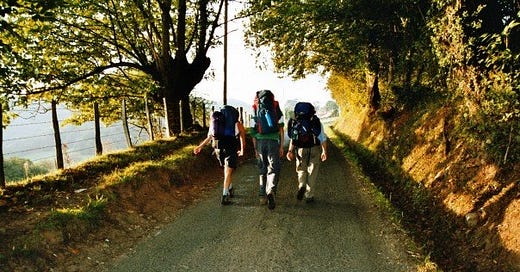


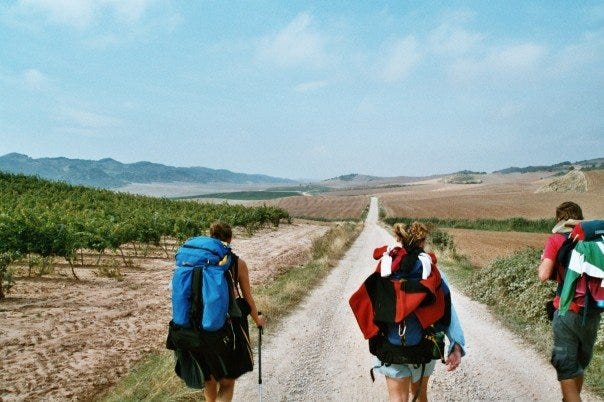
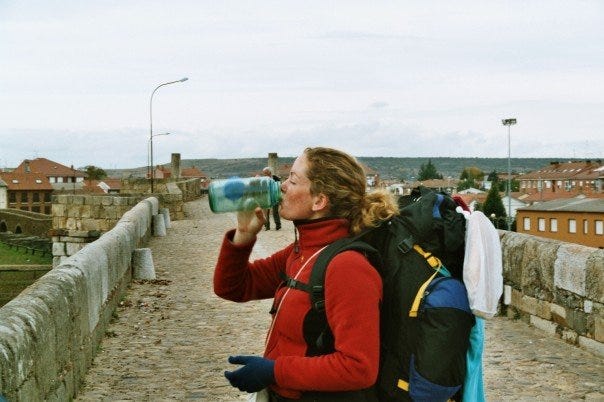

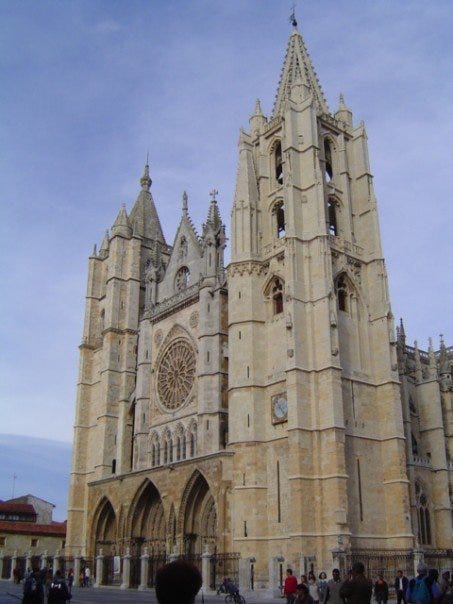
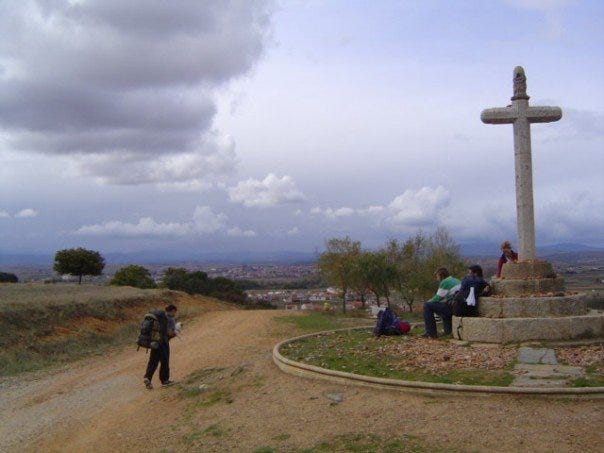
I appreciated reading about the moment when you experienced God. The contrast between how that impacted your pilgrimage and the experience your companions had is the perfect illustration of how I experience life when I walk with God versus when I don’t.
Such powerful words. Thanks for sharing them. I want to have my own camino experience now!